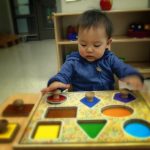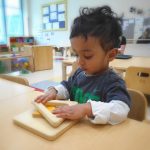Description & Learning Objectives
We offer puzzles to children on a daily basis. Activities involving fine motor development help children learn to rotate their wrists and use their fingers more constructively. Working with children help them learn to manipulate their hands in unique ways and even to use them simultaneously to complete a given task. Puzzles strengthen the muscles in the hands and wrists, promote cognitive development, and reinforce hand-eye coordination, which are skills they will use for the rest of their lives.
Materials
Various puzzles (depending on age group and skill level)
Observations & Findings
Working on puzzles also fosters children’s fine motor skills. They practice using their hands to manipulate and turn the puzzle piece until it fits correctly into its spot. This also helps children with their hand-eye coordination and provides them with a sense of accomplishment once they are able to fit the piece correctly or completed the whole puzzle.
Puzzle activities help children develop their cognitive development. These activities also encourage children to use what they know and apply it to what they see. By working with puzzles they learn and begin to grasp the concept of trial and error and the ability to match. These have been observed in instances such as turning the pieces different ways in order for the piece to fit into a specific spot, or looking at the picture to find its corresponding shape or object. As the children begin to master simple puzzles, they can move on to more complex puzzles such as seriation puzzles. By encouraging their problem solving skills, children are able to use the concepts that they have learned and mastered and apply it towards their daily lives.



